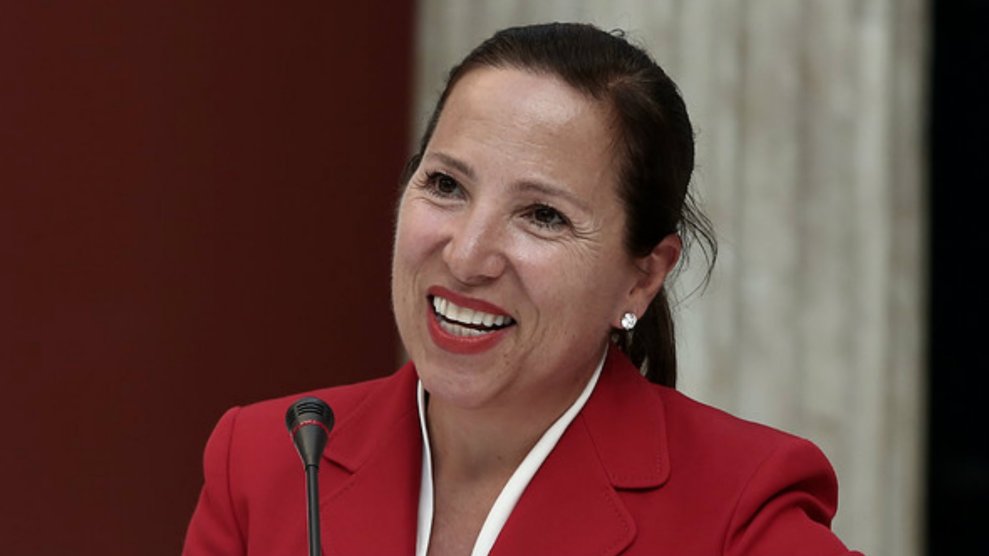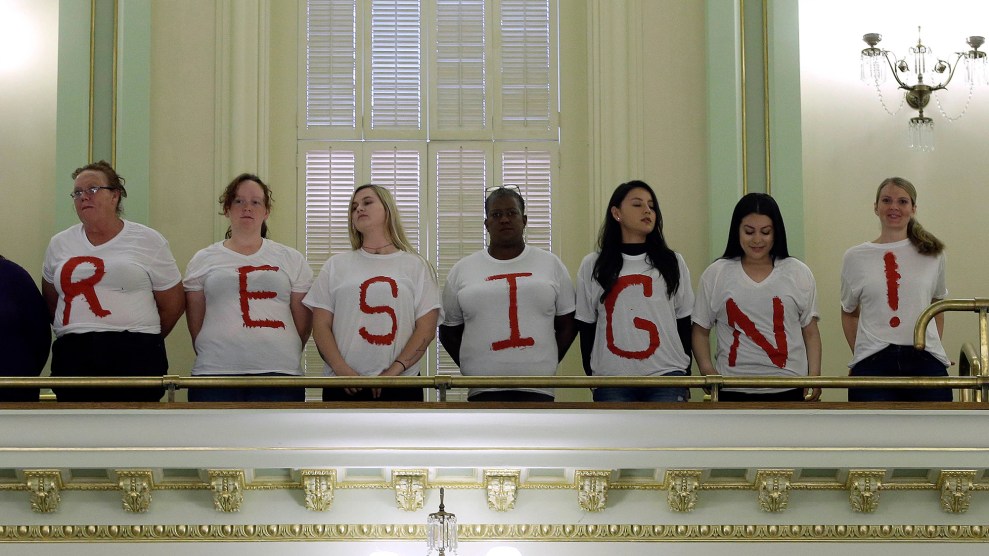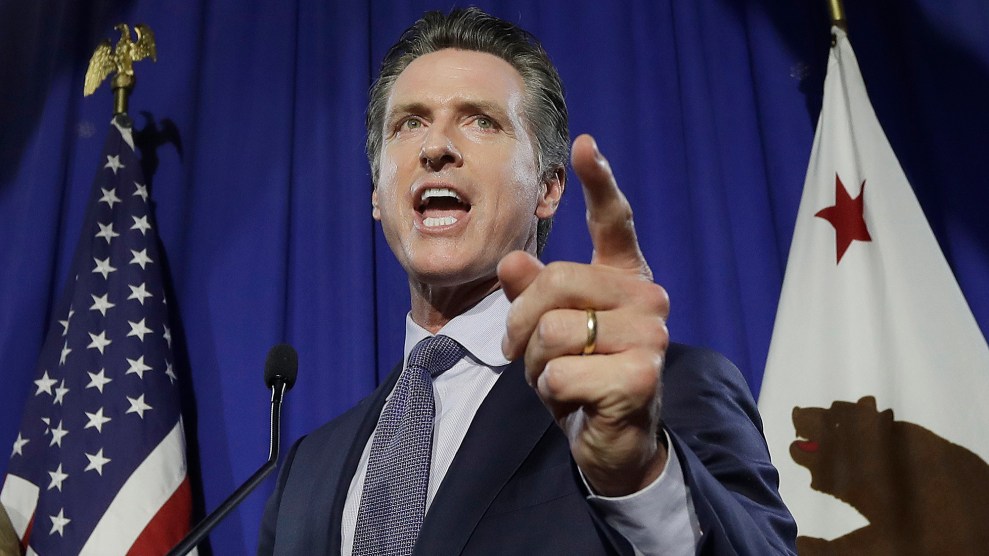
Eleni KounalakisZuma
When California voters go to the polls in November, they will choose between two Democrats to replace Lt. Gov. Gavin Newsom. One of the candidates is State Sen. Ed Hernandez, an optometrist from Los Angeles County. His opponent is Eleni Kounalakis, a former real estate developer and US ambassador to Hungary for President Barack Obama.
If she wins, Kounalakis will be the first woman to become California’s lieutenant governor, a position that is often considered a stepping stone to higher office. (Newsom is expected to become the state’s next governor.) The daughter of Greek immigrants, she often refers to the fact that her grandmother was illiterate and that she is the first person in her family to attend college. As a real estate developer in Sacramento, Kounalakis’ father was steeped in politics and became a big donor to state Democrats. She followed in his footsteps, working for her dad’s business for 15 years, while also diving into state politics, serving as a five-time delegate to the Democratic National Convention and developing a close relationship with Rep. Nancy Pelosi.
President Obama appointed Kounalakis as ambassador to Hungary in 2010, just as Viktor Orban took over as prime minister for the second time and began asserting his toxic brand of “illiberal democracy.” Soon after she arrived at her post, she shot wild boar with top Hungarian military officers on the Hungarian-Ukranian border. As she writes in her 2015 memoir, Madam Ambassador: Three Years of Diplomacy, Dinner Parties and Democracy in Budapest, “Hunting didn’t intimidate me—I grew up in a family of hunters and handled plenty of guns… Sure, my ego was at risk, but my position was more important.”
After she returned home, the rise of Donald Trump motivated her to run for office. “Most of us didn’t believe that it could happen here, because we thought that our democracy is too strong to elect someone who could employ the same tactics,” she says. Mother Jones caught up with Eleni Kounalakis to talk about her political ambitions, California’s housing crisis, and what she learned about authoritarian leaders from her Hungarian experience.
Mother Jones: Why do you want to be California’s lieutenant governor?
Eleni Kounalakis: The job is often disparaged, but it’s a constitutional office in the state of California, and there are only eight of them. The lieutenant governor serves on the board of the California State University system and the University of California. My grandmother never learned to read or write, and she let my father come to America at age 14, no money, no English, to work in California as a farmworker. He ended up at Sacramento State University. I ended up becoming the first in my family to graduate from a four-year college. Keeping those doors open to all Californians is essential for allowing other families to live the American Dream, but it’s also the foundation of our society, and the foundation of our economy. Second, you sit on the State Lands Commission, which is the most important block between Donald Trump and offshore drilling off of our coast. Then, you chair the Commission of Economic Development for the state. Obviously the governor’s role in economic development is the most important, but the lieutenant governor’s office has a role. For me, bringing down the cost of housing in this state is essential.
MJ: You once said that when you were considering elected office in the 2000s, some people warned you that your career as a land developer could be used against you. Given California’s housing crisis, how do you see your role as a land developer playing out? Has it been weaponized?
EK: I’m a businesswoman, but I’m not a Wall Street businesswoman, and I never have been. My business was delivering housing projects in the Sacramento region that were affordable to working-class and middle-class families, with price points in the $200,000 range—this is housing that has been lost since the recession. The dramatic increase in the cost of housing in this state is driving people into homelessness. It is driving families into poverty. And it is driving businesses and families out of the state. So I hope to use my experience in helping rebuild economic security in our middle-class families and rebuilding that pathway into the middle class for working-class families.
MJ: There have been a number of recent California measures regarding housing—from an anti-rent-control budget initiative to SB-827, which was defeated but was supposed to strengthen access to affordable housing near transit stops. What do you think needs to be done?
EK: There are a lot of different ways to do this, but ultimately there has to be the recognition that we simply must build more housing. And I know that we can deliver more housing in California and protect our environment, and do it in a way that is financially feasible. There is a brain trust in Sacramento with [state Sens.] Scott Weiner, Toni Atkins, Nancy Skinner, and [State Assemblymember] David Chiu, who are looking hard at the housing issue and what we’re going to do about it. If I win, I will seek to work with these four people, and with the next governor, if it’s Gavin Newson, to fulfill his pledge to deliver 3.5 million more housing units by 2025. We’re going to have to do that with buy-in and leadership from cities and counties, from local government, and from the environmental community. Among all of these stakeholders, I will be the only government official who has also been an applicant in the housing process.
MJ: Your father donated over $5 million to your campaign. In the past you criticized Cole Harris, your Republican opponent, for having donated more than $2.2 million of his own money to his campaign. Could you comment on that?
EK: I believe in publicly funded campaigns and campaign finance reform. In the current system, candidates are forced to rely too much on institutional funding and their own resources. In my case, I accepted a spending cap and am very proud to have raised funds from nearly 2,500 donations to my campaign. There was an independent effort during the primary campaign in support of my candidacy, and a significant part of the funding came from my father. This was all allowed under the current regulations, and frankly, unlike special interests, the support of my family comes with no strings attached.
MJ: I’m going to pivot to 2010 when you began your three years as the US ambassador to Hungary. You arrived shortly before Viktor Orban became the prime minister and watched his rise to power. You saw how he has become one of the leaders in Europe’s nationalist and xenophobic movement. He recently won a huge victory for another term in office despite concerns about human rights and his attacks on the European Union. What did his success tell you about how demagogues can appeal to voters?
EK: I think that what happened in Hungary can happen anywhere. Certainly there were certain elements of Hungarian history and Hungarian culture that made the rise of Viktor Orban a unique story. But when you draw the lens back, you can see parallels throughout history and in modern-day political reality. It started with the economic crisis of 2008. Once you have the weakening of economic security among families, it sets the stage for populist leaders to rise up. Orban saw that opportunity, he saw the far right gaining power, and so he took some of their arguments and made his platform more palatable than that of the more extreme far-right party. By the way, he was heavily influenced by watching Vladimir Putin consolidate power in Russia, but he needed to be careful not to run afoul of Hungary’s membership in the European Union and NATO.
MJ: What were the steps that you saw him take?
EK: His very first laws had to do with constraining freedom of the press, and his very first actions were in intimidating the free press and, frankly, firing people in the press he knew didn’t like him. He could do that because the Hungarian press was substantially government-owned, or government-sponsored through advertising. Secondly, he went after the court. First administratively, by lowering the retirement age by something like 12 years. Immediately all these high-level members of the court had to go home. He was then able to replace them with people he liked. Then he institutionalized it with a reform process for the judiciary, which gave him more of an ability to consolidate power and limit the judiciary’s independence.
MJ: He also rewrote the constitution, didn’t he?
EK: They went after everything. They went after the size of the parliament. They reformed the election laws. They reformed the laws of how you can operate a religious institution. They clawed back control of local government throughout Hungary and consolidated it into their hands in Budapest. They went and found models within other European Union countries to be able to then say our new religion law is much more liberal than the one in, say, Greece. I would argue Orban did not go as far as he wanted to because of our intervention, and in fact he just made a comment that he and the parliament are going to go through another reform process of the constitution. So my sense is that everything we kept them from getting in the first go-round, they’re probably going to go after now.
MJ: Did the United States try to intervene?
EK: President Obama was very engaged. The White House was engaged, Secretary Clinton was engaged. We at the embassy became the experts overnight. Ordinarily, countries where there are issues like this have a whole team at the State Department, but Hungary was truly a “mission accomplished” country after the end of the Cold War, so we at the embassy were on the first lines of trying to figure out the best way to deal with this. What President Obama directed us to do was to work with the EU and to really push the European Union institutions, like the Venice Commission, like the Council of Europe, to hold Hungary’s path.
MJ: The parallels of attacking the press, changing the courts, questioning election laws, sound very familiar even for people who aren’t experts in Hungarian politics. Was there anything about seeing Orban’s success in Hungary that may have prepared you for Trump?
EK: Well, there’s a playbook, and I could see the parallels with Vladimir Putin with what Orban did. We saw the same playbook at work in Poland and in Austria, with the increased power of Marine Le Pen in France, and now in Italy. I’m going to be really honest here, most of us didn’t believe that it could happen here, because we thought that our democracy is too strong to elect someone who could employ the same tactics. When the vote came in, I was sitting on the floor in the Javits Center with my husband, who’s a foreign policy expert. He said it felt like instead of the glass ceiling coming down, the floor had just fallen out beneath us.
There’s no question that Trump was a motivating factor for me to run for lieutenant governor. It takes courage to run for office. I don’t know that I had the courage to do it before Donald Trump, but I certainly knew immediately after that I would do whatever it took to do whatever it took to help my country and the vision of American democracy that we have worked so hard to perpetuate in the world, that it was time to fight for it here at home. I believe that California has, by far, the best chance in helping to ensure that democracy stays strong in America, by being successful as a state, economically and politically.
MJ: The president had his rather shocking meeting in Helsinki. Given your experience in Hungary, could you talk a bit about how his performance was likely perceived in that part of the world? Did you have to deal with Orban’s outspoken admiration for Putin when you were ambassador?
EK: I continue to be concerned and dismayed to see the Trump administration turn its back on our allies and foreign policy norms which have been established over decades. It is time now, more than ever, for American democracy to show its strength by electing leaders who will advance comprehensive American leadership, commitment to our allies, and stability and security in the world.
This interview has been edited for clarity and length.












